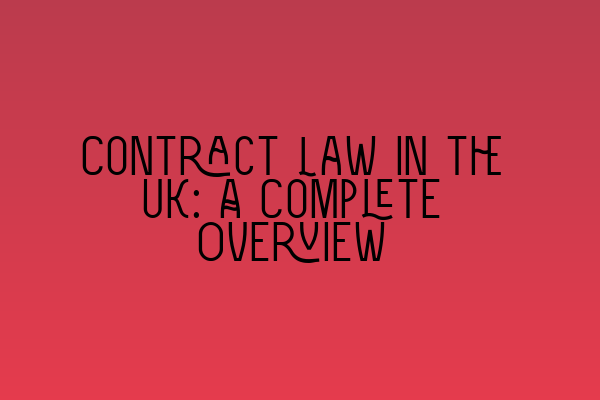Contract Law in the UK: A Complete Overview
Contract law plays a crucial role in governing business transactions and legal agreements in the United Kingdom. Understanding the basics of contract law is essential for both individuals and businesses to ensure they enter into fair and enforceable agreements. In this comprehensive overview, we will cover the key principles and elements of contract law in the UK, providing you with a foundation to navigate contractual relationships with confidence.
What is Contract Law?
Contract law is a branch of civil law that governs agreements between parties. A contract is a legally binding agreement, enforceable by law, which sets out the rights and obligations of parties involved. These agreements can be verbal or written, although it is always recommended to have written contracts to avoid any misunderstandings or disputes.
Within contract law, there are certain essential elements that must exist for a contract to be considered valid and legally enforceable.
Essential Elements of a Contract
To be valid and legally enforceable, a contract must include the following elements:
- Offer: An offer is a clear statement of the terms upon which one party is willing to enter into a contract. It must be communicated to the other party.
- Acceptance: Acceptance occurs when the other party agrees to the terms of the offer. It must be communicated and unconditional.
- Consideration: Consideration refers to something of value exchanged between the parties. It can be in the form of money, goods, services, or a promise to do something.
- Intention to Create Legal Relations: Both parties must have the intention to create a legally binding agreement. This element is presumed in commercial transactions but may be more complex in personal or social agreements.
- Capacity: Each party must have the legal capacity to enter into a contract. This means they must be of legal age, of sound mind, and not under any undue influence or duress.
- Consent: Consent must be freely given by each party, without any misrepresentation, mistake, or fraud.
- Legality: The contract must not be for an illegal purpose or against public policy. It should not involve an illegal act or be contrary to established legal principles.
These elements work together to form a valid contract. If any of these elements are missing, the agreement may be considered void or unenforceable.
Types of Contracts
Contracts can take various forms depending on the nature of the agreement. Here are some common types of contracts:
- Written Contracts: These contracts are in writing and signed by the parties involved. They provide a clear record of the terms and conditions agreed upon.
- Verbal Contracts: Verbal contracts are made through spoken words and do not require a written document. However, proving the existence and terms of a verbal contract can be challenging without supporting evidence.
- Implied Contracts: Implied contracts are formed based on the conduct of the parties involved. While not explicitly stated, the terms and conditions can be inferred from their actions.
- Unilateral Contracts: A unilateral contract is an agreement where one party makes a promise in exchange for a specific act or performance from the other party. The contract is formed once the act is completed.
- Bilateral Contracts: Bilateral contracts involve mutual promises between two parties. Each party agrees to do something or provide something in return for what the other party has promised.
It is important to understand the specific type of contract you are entering into to ensure you are aware of your rights and obligations.
Contractual Terms
Contracts are composed of terms, which outline the rights and responsibilities of each party. There are three types of contractual terms:
- Express Terms: Express terms are explicitly agreed upon by the parties and are included in the written or verbal contract.
- Implied Terms: Implied terms are not explicitly stated in the contract but are implied by law or custom. They are considered necessary for the proper functioning of the contract.
- Conditions and Warranties: Conditions and warranties are types of terms that determine the level of importance or obligation within the contract. Conditions are essential terms that go to the root of the contract, and a breach may result in termination. Warranties, on the other hand, are less important terms, and a breach only entitles the innocent party to damages.
Understanding the different types of terms will help you interpret and enforce your contractual rights more effectively.
Contractual Disputes and Remedies
Disputes can arise in contractual relationships due to various reasons, such as breach of contract, misrepresentation, or disagreement over contract terms. When a dispute occurs, various remedies may be available, such as:
- Compensatory Damages: This is the most common remedy for breach of contract, where the innocent party is awarded financial compensation to cover their losses.
- Specific Performance: Specific performance is a remedy where the court orders the breaching party to fulfill their contractual obligations rather than awarding damages.
- Rescission: Rescission involves canceling the contract and restoring the parties back to their original positions. This remedy is typically available in cases of misrepresentation or fraud.
- Injunction: An injunction is a court order that prohibits a party from doing something or requires them to do something. It is typically used to prevent irreparable harm or enforce specific obligations.
When facing a contractual dispute, seeking legal advice from a qualified solicitor is essential to ensure you understand your options and protect your rights.
Contract law is a complex area that requires careful consideration and adherence to legal principles. Familiarizing yourself with the basics of contract law in the UK will empower you to make informed decisions and navigate contractual relationships with confidence.
For further resources and preparation for the SQE exam, you may find the following articles helpful:
